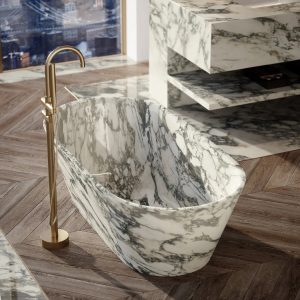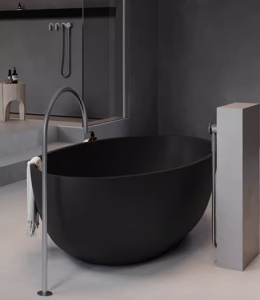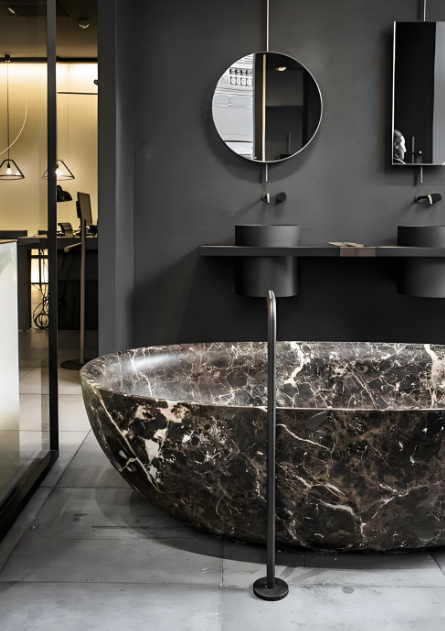When we talk about home decoration, the bathtub may be the element that best reflects the taste of life. Those sophisticated natural stone bathtubs might have caught your eye in different home magazines or on social media. They seem more like a piece of art than merely somewhere to relax. However, did you realize that the contents of the bathtub may significantly influence not only its look but also our health? Next, I will take you to explore the material selection of natural stone bathtubs and their relationship with health, and see what kind of health secrets are hidden behind these beautiful stone bathtubs.

Textured natural stone bathtub
Natural stone bathtubs: beauty and health coexist
First, let’s take a look at the common materials of natural stone bathtubs. Among the most often used natural stones are marble, quartz, granite, sandstone. Apart from their beauty, these materials are well-liked because they are robust, resilient, and let people feel connected to nature. However, despite their charming appearance, each stone actually has its own advantages and disadvantages, especially when we consider their impact on health.
1. Marble bathtub: subtle health risks in elegance
Marble may be one of the most representative natural stones. Many individuals fall in love with it because of its special gentle tones and texture. Regarding health, however, marble also raises some minor issues. Marble is a porous material that readily absorbs dirt and moisture, thus if it is not kept in time, the surface of the bathtub could develop bacteria. In addition, marble needs to be sealed regularly to prevent tiny cracks on its surface, which can avoid potential hiding places for bacteria.
2. Quartz bathtub: a balance between health and durability
Quartz is a relatively new material that has become increasingly popular in bathtub design in recent years. Natural quartz and resin are combined to make it. It offers great stain resistance in addition to being naturally beautiful from natural stone. Due to the non-porous nature of quartz, it is not easy to absorb moisture and bacteria, which makes it more advantageous than marble in terms of hygiene. Those who are chemically sensitive, however, can find pain from the resin component of quartz. Thus, be sure the composition of the quartz bathtub satisfies environmental criteria before selecting it.
3. Granite bathtub: a hard natural choice
If you want a bathtub that is almost “indestructible”, then granite is a good choice. Because of its great durability and scratch resistance, granite is often utilized in kitchens and bathrooms on counters. But because of its natural texture, granite’s surface can also be home for grime. Though it is somewhat resistant to germs, its surface must be kept as smooth as new by constant cleaning and upkeep. Granite itself is relatively safe for health, but it is also important to pay attention to whether it has been environmentally friendly.
4. Sandstone bathtub: natural touch and health issues
Sandstone is a relatively uncommon but increasingly popular material. Its subtle tones and natural texture fit perfectly for establishing a natural bathroom environment. Similar to marble, sandstone is also a porous material that easily absorbs moisture and dirt, which can cause problems for bacterial growth. If improperly sealed, sandstone bathtubs—especially in humid conditions—can become a haven for mildew and bacteria.

Black natural stone bathtub
Potential health effects of natural stone
Natural stones themselves are usually not directly harmful to health, but their characteristics may indirectly affect your health experience. Many natural stones first of all are porous and readily absorb dirt and moisture. Bad cleaning and maintenance practices could let mold and bacteria flourish. This goes beyond mere cleanliness. Certain molds may also aggravate health issues including skin allergies and respiratory disorders.
Second, especially granite and some rare stone kinds, some natural stones may have minute levels of radioactive materials. Though often the content of these radioactive elements is low enough to have a major influence on health, long-term exposure nevertheless calls some attention. If you are particularly sensitive to radioactive elements, or if there are young children and elderly people in your home, it is best to consult a professional or choose an environmentally friendly stone that has been tested and certified when choosing stone.
Natural stone bathtubs: maintenance and care
After choosing a natural stone bathtub, regular cleaning and maintenance are essential. Most natural stones are porous, hence if they are not kept clean over time, stains will sink right into the stone and be challenging to remove. Using a specific natural stone cleaning is advised to help to prevent chemicals erasing the stone surface. Moreover, consistent stone sealing helps to stop dirt and moisture from penetrating the bathtub and increases its lifetime.
For people who are sensitive to health, special attention should also be paid to choosing cleaners with low chemical residues to reduce the risk of skin contact or respiratory inhalation of harmful substances. Apart from efficiently cleaning the surface of the bathtub, environmentally friendly cleaners help to safeguard family members’ health.
Environmental impact of natural stone bathtubs
In addition to the direct impact on health, the production process of natural stone also has certain environmental considerations. Natural stone mining and processing will have some detrimental effects on the environment, particularly with regard to massive quarrying operations that might harm the ecological surroundings. Therefore, if you care about environmental issues, you may consider picking recycled stone, which will not only lessen the environmental load but also enable you to feel successful of coexisting in harmony with nature. Stone suppliers that have been certified sustainable should also be taken under consideration.

Natural stone bathtub marble
Natural stone bathtubs are not only intoxicating in terms of beauty, but the choice of their materials is also closely related to health and environmental protection. From marble to quartz, every material offers special benefits and difficulties. When selecting a bathtub for your house, you could wish to give these elements great thought and choose the ideal one depending on your needs for health and lifestyle. Keep regular cleaning and maintenance, so that your natural stone bathtub will not only become a highlight of your home, but also a safe and healthy relaxation space.
Frequently Asked Question (FAQ)
How to upgrade your bathroom with a travertine bathtub?
To make a travertine bathtub stand out in your bathroom, consider the following tips:
1. Match neutral tones with soft tones like beige, light gray, and cream, creating a warm and unified space.
2. Add natural elements like wooden cabinets, green plants, and rattan baskets to highlight the bathtub’s natural texture.
3. Choose simple but not simple hardware like gold, matte black, or stainless steel for faucets and shower heads, adding a modern touch.
4. Allow plenty of natural light into the bathroom, as travertine bathtubs emit a warm glow in the sun. If natural light is insufficient, consider warm-toned lighting to create a comfortable and relaxing atmosphere.





